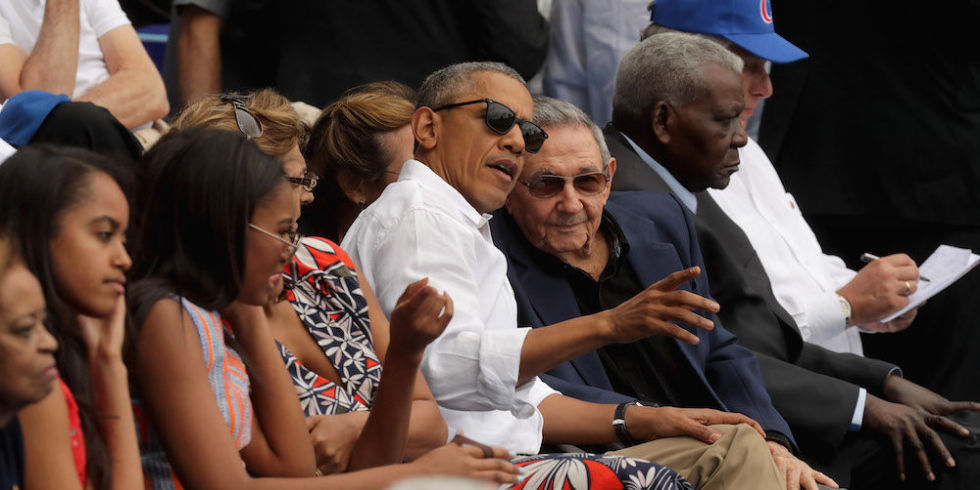The President’s landmark trip to Cuba showed, yet again, what a masterful performer Obama is on the world stage. The press conference with Raul Castro was a masterpiece in and of itself. He went to Cuba to end the embargo and to encourage a change of regime in Cuba. He understood that the embargo justifies the Communist regime. Because of the embargo, the Castros are able to explain away Cuba’s terrible poverty as a result of foreign oppression, and justify their repressive political tactics as a means of national self-determination. Obama brought Raul Castro onto a stage and stripped away those justifications in front of the whole country. Not only that, but he forced Raul Castro to answer questions about human rights abuses from the American press. And Castro stumbled. He was not used to having to answer questions. And the people of Cuba saw him stumble. They were not used to seeing that.
Through this series of tiny gestures, Obama achieved what 50 years of American resistance to Cuba was not able to. He defused any lingering military tension. He showed the Cuban people that America has good intentions. And he managed to humiliate the Castros, utterly, without appearing, even in the slightest, aggressive. He did all that in a couple of hours. There’s only one word for it: genius.
Obama’s domestic legacy has been established for a while now. Unemployment peaked at 10 percent and he brought it down to five. The number of Americans with health insurance has expanded enormously over the past eight years. Gay marriage became legal under his presidency. Obama’s more fundamental promise—to unite Americans of both parties in a single transcendent vision of a country beyond partisanship—has utterly failed. But at least, on the domestic front, the size of his achievements and his failures has been widely recognized. Recently, the much more complicated issue of Obama’s foreign policy legacy has come into focus—mainly through Jeffrey Goldberg’s deep dive into its intellectual basis in The Atlantic, but also through his recently concluded trip to Cuba, which is a case study of that policy in action.
The Obama Doctrine, as it appears in Goldberg’s account, is much less a coherent foreign policy ideology than a basic recognition of the world as it is: the moral dilemmas of American power in a post-Iraq world make anything as simplistic as an ideology at best silly and at worst destructive. Other commentators have found Obama’s reticence to attempt to solve all the world’s problems timid. But, if Obama has failed in Syria, it is at least unclear that the failure is America’s. Obama is willing to state the obvious: Despite what you hear during Republican primaries, the United States cannot create outcomes in the world at will. The law of unintended consequences is a powerful force. Whichever president follows Obama will almost certainly lack this kind of intellectual flexibility and humility.
But that is not what will be most missed next January.
The limp-wristed hand-raise alone shows that Obama’s game is simply on a different level thanany other American politician or any other foreign leader. The quick thinking required to understand how it would look is astonishing; it’s like some great athlete making a clutch play. Just by standing beside Castro he was able to demonstrate that America was cool and positive and progressive and Cuba was run by a ridiculous old man.
But it was not only the press conference. Obama’s decision to attend a baseball game after the attacks in Brussels was another significant gesture. “The whole premise of terrorism is to try to disrupt people’s ordinary lives,” he said as a justification. Was I the only one to breathe out a grateful sigh at this humane and calm response? I thought immediately, in contrast, of George W. Bush reading to The Pet Goat after the news of the September 11 attacks came in, sitting there trying to figure out what to do and then rushing out to react blindly and, in the end, stupidly. Obama’s cool was not an act of disrespect to the victims, or any other nonsense the Republicans have been claiming. It was not just cool and calm; it was displayed cool and calm. The world is much better, much safer, when America displays cool and calm.
The decision to end the embargo with Cuba was a radical change in United States foreign policy. But is so obviously correct that any return to an embargo is already inconceivable. Anyone who still believes that the new openness is somehow going to support the Cuban dictatorship, should listen to what Jose Daniel Ferrer, leader of Cuba’s largest dissident group, told The New York Times, about the Obama visit: “It was a light in the dark.”
Unfortunately, whoever comes next, whether Democrat or Republican, will have nowhere near the skill that Obama has at making meaningful gestures like those he showed in Cuba. Whoever wins in November, the next American leader will inevitably be less effective—whether it’s Hillary Clinton with her compromised inertness or the impotent savagery of Trump or Cruz. Whatever the strengths and weaknesses of the Obama doctrine, in 2017, the United States will be missing its greatest foreign policy asset: the man himself.
Culled from Esquire














